MercoPress. South Atlantic News Agency
Tag: Mauricio Macri President
-
Monday, March 27th 2017 - 08:36 UTC
Labor and social conflicts eroding the image of Argentine president Macri
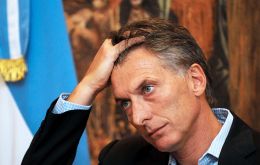
Argentine president Mauricio Macri is facing a challenging scenario in a crucial year of midterm elections.
-
Thursday, March 23rd 2017 - 11:50 UTC
Massive teachers protest in Buenos Aires challenging austerity measures

Tens of thousands of Argentine teachers marched in the capital Buenos Aires on Wednesday as part of a nationwide strike challenging the administration of President Mauricio Macri. Unions for private and public school teachers are demanding a pay increase of 35% to compensate for Argentina's high inflation in consumer prices.
-
Wednesday, March 22nd 2017 - 12:20 UTC
Relief for Macri: stats confirm the economy is moving out of recession

Argentina's economy exited a prolonged recession in the second half of last year, with government data on Tuesday showing a 0.5% expansion in the fourth quarter of 2016 compared with the third quarter. Indec stats agency also revised its estimate for third-quarter GDP to a 0.1% increase over the second quarter, up from a 0.2% decline previously. Taken together, the data show Argentina's economy grew in the second half after shrinking for three straight quarters.
-
Friday, March 17th 2017 - 21:55 UTC
Unemployment in Argentina falls to 7.6%: less people looking for jobs
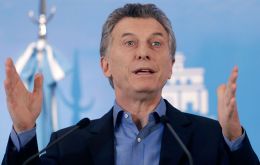
Argentina's unemployment rate fell to 7.6% in the fourth quarter of 2016, the government's Indec statistics agency said in a report on Thursday, down from 8.5% in the third quarter as thousands of people stopped looking for work.
-
Monday, March 13th 2017 - 12:11 UTC
A third of Argentina's population live in poverty, according to the Catholic Church
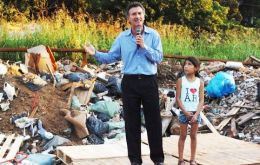
Argentina urban poverty rate rose to 32.9% in the third quarter of 2016, which means 13 million people due to a precarious labor market and lack of long-term development policies, according to a report presented last week by the Social Debt Observatory from the Argentine Catholic University (UCA).
-
Wednesday, March 8th 2017 - 09:42 UTC
Argentina: “The honeymoon with the Macri administration is over” warns analyst Fraga
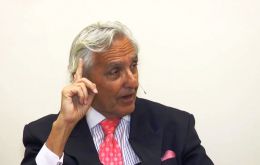
“The honey moon is over” and the government of President Mauricio Macri must rapidly reconsider its strategy since public opinion is no longer responsive to the expectations of the first fourteen months, according to Argentine political analyst Rosendo Fraga. His analysis was also supported by another political commentator Carlos Pagni, who said all opinion polls indicate a sliding drop in expectations.
-
Thursday, March 2nd 2017 - 08:46 UTC
Macri claims Falklands' sovereignty, emphasizes dialogue and strategic alliance with Brazil
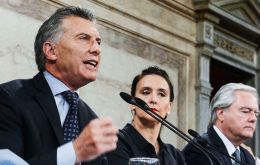
President Mauricio Macri during the opening of a new legislative session on Wednesday renewed Argentina's sovereignty “legitimate claim” over the Malvinas, Georgia and South Sandwich Islands but also emphasized that “dialogue strengthens our position” in the dispute with the United Kingdom.
-
Sunday, February 26th 2017 - 11:29 UTC
Argentine economy finally seems to have began a rebound
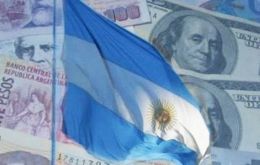
Argentina's economic activity rose 1.6% in December compared with the previous month, government data showed, a sign the economy likely expanded in the fourth quarter after a long recession. The economy fell 0.1% in December year over year and closed 2016 down 2.3% compared with 2015.
-
Sunday, February 26th 2017 - 11:21 UTC
YPF and Shell reach deal to develop oil and gas assets in Vaca Muerta shale field

Argentina's state-run oil company YPF said it reached a preliminary deal with Royal Dutch Shell Plc to develop oil and gas assets in the Vaca Muerta shale field, involving a US$300 million investment from Shell.
-
Thursday, February 23rd 2017 - 10:20 UTC
Argentina's Macri in state visit to Spain to attract investors
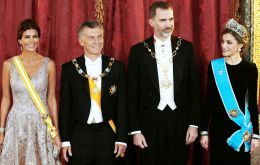
Argentine president Mauricio Macri started an official state visit to Spain on Wednesday and was received with a display of full military honors of the Royal Household at the Royal Palace. Following a meeting with King Felipe, the president left for Congress where he addressed the full house.
